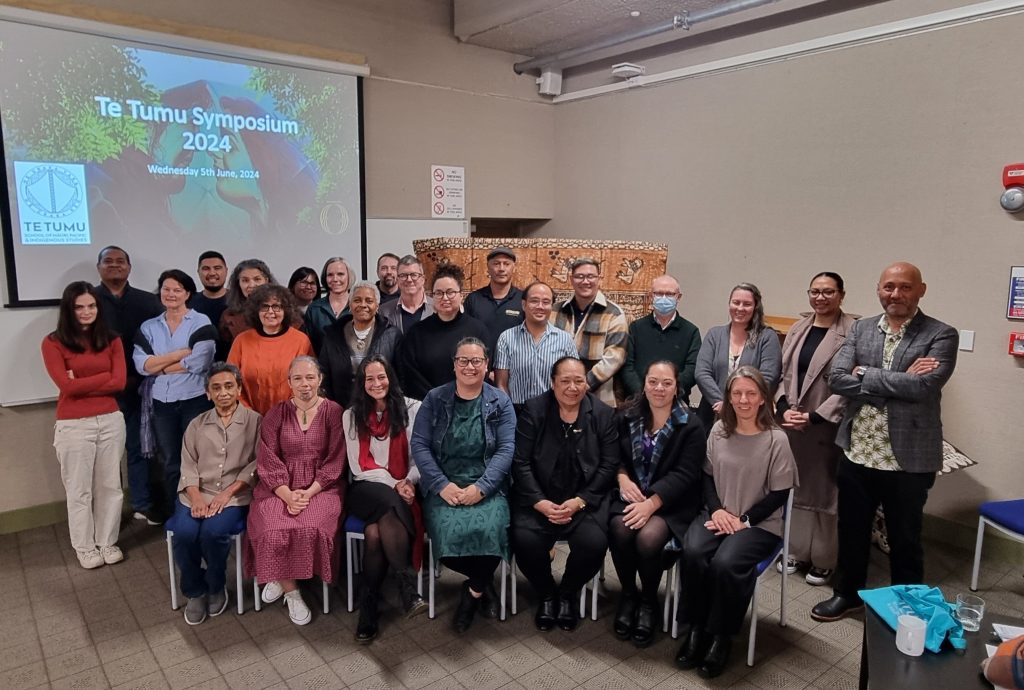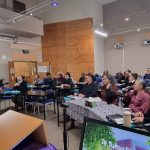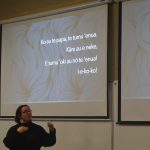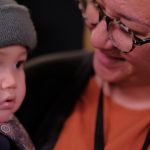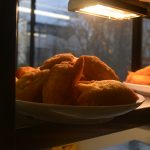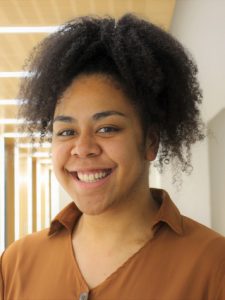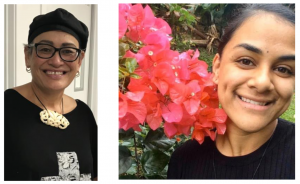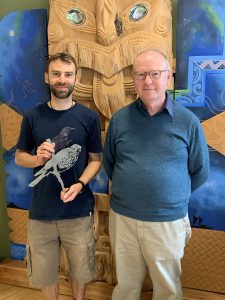Inaugural Te Tumu Symposium a showcase of diverse research excellence
On Wednesday 5 June, Te Tumu, School of Māori, Pacific and Indigenous Studies, hosted its inaugural research symposium to share and celebrate research from Te Tumu. The day began with a welcome from Te Tumu Dean Prof Patrick Vakaoti and a history of Te Tumu from Prof Michael Reilly. The programme included four sessions of Te Tumu staff and postgraduate students’ presentations, constructive question and answers segments, feedback, and encouragement.
Supported by Te Tumu’s Research Committee and Postgraduate Committee, the event welcomed attendance from those who are based in Ōtepoti, as well as distance students who are based in Te Whanganui ā Tara, and as far afield as New Caledonia. With special Tītī and fry bread kai, this gathering was truly an inspiring occasion and speaks to exciting research work that Te Tumu staff and students are doing locally, and regionally that are important contributions for their communities, and for the growth of Māori, Pacific and Indigenous Studies scholarship.
Session 1 was facilitated by Dr Paerau Warbrick, a lecturer in Māori Studies, and included presentations by Te Tumu staff member Paia Taani on intergenerational language transmission; and PhD students, Jenni Tupu who presented about transracial adoption, and Ella Cameron-Smith who presented on Ngaati Korokii Kahukura kai identities.
Session 2 was facilitated by Dr Telesia Kalavite, a lecturer in Pacific Studies, and included presentations by four PhD students: Frédéric Dichtel who presented on te reo grammatical structures; Regina Maniam who presented on engaging Indigenous values and methods in doctoral research; Stacey Kokaua-Balfour who presented on Cook Islands’ creative texts relating to the environment and climate change; and Jay Quintos who presented on critical perspectives on films about the Tboli people in the Philippines.
Session 3 was facilitated by Prof Michael Reilly, the Postgraduate Chair of Te Tumu. The session included staff member Prof Richard Jackson who presented on non-violent approaches to counterterrorism, and two PhD students: Jude Bautista who presented on visual social semiotics and critical lenses in discourse analyses; Kim Cope Tait who presented on personal sovereignty in the poetry of Hinemoana Baker.
Session 4 was facilitated by Dr Emma Powell, lecturer in Indigenous Studies and Programme Coordinator of the Master of Indigenous Studies (MIndS). The session included three MIndS distance students: Melissa Denzler, based in Te Whanganui ā Tara who presented on the cultural taxation of kaiako Māori; Elizabeth Hamilton, based in Whakatū, who presented on a approach for honouring Te Tiriti specifically relating to language learning policies for migrants and former refugees; and James Uri-Puati, based in the Cook Islands, who presented on a critical Indigenous framework for theorising second language learning.
COVID-19 Talanoa: the South Canterbury Tongan community
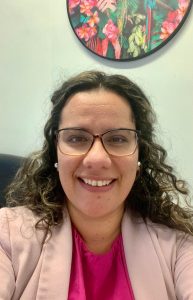 Last week, Pauline-Jean Luyten (Tongan, Dutch) walked across the graduation stage to be “capped” for completing her Master of Indigenous Studies degree.
Last week, Pauline-Jean Luyten (Tongan, Dutch) walked across the graduation stage to be “capped” for completing her Master of Indigenous Studies degree.
Pauline is a Timaru-based lawyer. She conducted her MIndS research on a local topic, but one that touches everyone across the globe: “COVID-19 Talanoa: The Voices of Tongan Kāinga in South Canterbury”. Dr Telesia Kalavite, of our Pacific Islands Studies programme supervised this research.
Abstract: This research is an exploratory study on the experiences of Tongan kāinga (distant relations/community) in the rural region of South Canterbury, New Zealand before and during the COVID-19 pandemic. It examines Tongan kāinga’s migration stories and their experiences in response to COVID-19 from March 2020 to May 2020. Migration stories were gathered to provide background and context for Tongan kāinga’s diverse responses during COVID-19 and to acknowledge participants’ journey to the diaspora. A further aim was to challenge the deficit theory paradigm often ascribed to Pacific ethnic-specific populations by demonstrating the richness and strength of Tongan cultural values, knowledge, and customs. The Kakala methodology comprised individual talanoa with nine participants based in South Canterbury. Findings showed that kāinga Tonga in South Canterbury derived strength from their children, family, and faith to persevere and support each other throughout the COVID-19 pandemic. Hardships were navigated through care and concern for others, gathering and processing information, and collective activation and mobility.
Findings also revealed that participants negotiated between Tongan and Western values in the predominantly New Zealand European ethnic region. They do this as individuals, and as kāinga through the Tongan Society South Canterbury. Local community-based solutions and cross-cultural provider collaboration, irrespective of ethnicity, was strong and effective in South Canterbury with selective organisations. Participants reflected and demonstrated that Tākanga ‘Emau Fohe (together we can make a difference) contributed to overcoming hardships during COVID-19. This is the first piece of academic research on the experiences of Tongan kāinga in South Canterbury, or any comparatively small Tongan or Pacific ethnic-specific community in New Zealand. Further research is warranted.
Future plans: We asked Pauline what her future plans might be. She replied, “I intend to undertake PhD study and conduct further research on Tongan kāinga in the provincial regions in the South Island or isolated areas in Aotearoa New Zealand. Being NZ born with both Tongan and Dutch heritage, I have an interest in exploring the praxis of engagement between cultures, identity and belonging. Most importantly, to identify practical ways for our respective cultures to understand each other, substantiated in community-based solutions and research. I aim to utilise the knowledge and skills derived from my thesis to assist with cultural awareness and education described in a way that is understood by mainstream resident population whilst ensuring maintenance of Tongan values. Contemporaneously, I endeavour to be and support our kāinga to be at the decision-making table to ensure equity of input, equity of access and equity of outcome and challenge the deficit theory paradigm. This way we can carry our ancestors’ values and leave a legacy for our fānau (children)”
Fakamālō atu, Pauline. We wish you all the best with your future studies.
MIndS students’ success
It’s graduation this coming Saturday (21 Aug), and Te Tumu is lucky to have three Master of Indigenous Studies students who are graduating. This is always a wonderful occasion for graduates themselves, as well as their families and their supervisors.
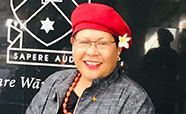 Tofilau Nina Kirifi-Alai (Sāmoa) was until recently the Manager of the University of Otago’s Pacific Islands Centre. She is currently the Inaugural Manager of Pacific Community Engagement, University of Otago, based in Auckland. This is a new role that the University of Otago established this year.
Tofilau Nina Kirifi-Alai (Sāmoa) was until recently the Manager of the University of Otago’s Pacific Islands Centre. She is currently the Inaugural Manager of Pacific Community Engagement, University of Otago, based in Auckland. This is a new role that the University of Otago established this year.
Research Title: “The Development of the Pacific Islands Centre at the University of Otago, Dunedin, New Zealand: A Personal Reflection”.
Supervisor: Telesia Kalavite
Abstract: “The purpose of a Centre for Pacific students is to seek and find ways whereby meanings, nuances and metaphors in Pacific cultures can speak to the heart, the soul and the mind of the students. The challenge here, as in other places, lies in how to articulate speech and writing to get meanings, nuances and metaphors of Pacific cultures within a monocultural academic environment” (Comment by His Highness Tui Atua Tupua Tamasese Ta‘isi Efi‘s inauguration speech at the formal opening of the Pacific Islands Centre, University of Otago, in 2003).
The establishment of the Pacific Islands Centre (PIC) in 2001 was a response by the University of Otago (UO) to the Tertiary Education Commission (TEC) initiatives to ensure the success of its Pacific students. Pacific Islands people’s participation in New Zealand society, including education, is still lagging behind that of the general population since the late 1960s. The PIC was the first-ever centre within New Zealand Tertiary Education Organisations (TEOs) and this year, 2021, marks its 20th anniversary. The PIC creates pathways for students’ success at the UO reflecting the government’s continuous attempt to improve the success rate of Pacific peoples in the education system. The PIC strongly becomes the impetus to lead and implement support for Pacific students and staff through its engagement with the UO and Pacific communities locally, nationally, regionally and internationally.
This research takes an autoethnographic Pacific approach. Autoethnographic because it documents my reflections as the inaugural Manager of the PIC since 2002; Pacific because it is a Pacific-focused centre, operated by Pacific staff for Pacific students and, most importantly, I, the researcher am Samoan, and of Pacific decent. My voice becomes central in documenting the Centre’s developmental history because when I first started as the pioneer of the PIC there was no specific Pacific model to build on, or strategic framework or manual to guide it. This research therefore, is basically grounded on Pacific philosophies of attitudes, views, ideas, values, beliefs, customs, traditions, practices and experiences of the researcher.
The PIC is significant for the educational development of Pacific students and staff at the UO. This research documents the journey of the PIC in terms of its history, developmental strategic plans, practices and reviews that enhance the success of everyone involved. This research is unique and authentic in its approach as it provides first-hand information on how the PIC nurtures Pacific Islands students in their academic journeys. It also adds value to the development of educational strategic directions of the UO to benefit both Pacific and non-Pacific communities at Otago, New Zealand, the Pacific region, and the world.
The first generation consists of the maternal and paternal grandparents of the author, in which they discuss vasu in its political definition of ‘half-caste’ or of mixed ethnic heritage. This generation will also elaborate on contributing themes to vasu, such as their relationships with their kinship groups, languages/dialects and their Fijian identity. As this generation is the only group to have regular visits and contact with their rural villages, vasu will be viewed through this lens.
The next generation is of the author’s parents and they will also discuss themes such as their own Fijian identity, as well as the role of Fijian women, domestic workers and accessibility to the village. This particular generation is part of the urban migration and will reflect over vasu with this viewpoint.
Finally, the last generation is of the author’s and her maternal and paternal first-cousins. The supporting themes for this generation’s understanding of vasu are customary Fijian relationships and concepts, mixed ethnicity and the use of Fijian language and knowledge. This generation is a part of the Fijian diaspora in New Zealand and will be using this perspective in sharing their understandings and experiences of vasu. Eventually, similar elements and concepts will be highlighted, with each generation sharing their own narratives on what vasu is to them. Despite the different time periods and physical contexts, the prominence of the maternal lineage has proven to play a significant role in every generation of this family, particularly in a patriarchal society that is known to Fiji.
 Nicola (Nicky) Andrews (Ngāti Pāoa) Nicky is currently a faculty librarian at the University of San Francisco where she teaches undergraduates how to do research; and work on other projects including research into Indigenous information literacy. She is open to pursuing a PhD in the future.
Nicola (Nicky) Andrews (Ngāti Pāoa) Nicky is currently a faculty librarian at the University of San Francisco where she teaches undergraduates how to do research; and work on other projects including research into Indigenous information literacy. She is open to pursuing a PhD in the future.
Nicky was initially supervised by the late Alumita Durutalo. Paerau Warbrick took over during the research design and interview phase, and Erica Newman supervised her work during the bulk of the writing and revising phase. Nicky is thankful to all three for their work and care. She will graduate in absentia.
Research title: “Historical Trauma, Indigenous People, and Libraries.”
Abstract: Historical trauma theory (HTT) built on understanding of Holocaust survivors and subsequent generations (Pihama et. al., 2014) and articulated how colonization and genocide against Indigenous peoples also resulted in historical trauma and intergenerational grief (Brave Heart & DeBruyn, 1998; Methot, 2019). In this research report, I examine how modern libraries reinforce historical trauma for Indigenous library users and workers through library origins, professional credentialing, staffing demographics, and policies. While historical trauma theory is rooted in social work (Brave Heart & DeBruyn, 1998), it is applicable to librarianship as a profession of public service that impacts Indigenous access to knowledge and self-discovery.
I conducted my research using kaupapa Māori and autoethnography frameworks, to interview five Indigenous librarians from Aotearoa, Canada, and the United States. Over Zoom, participants detailed their unique experiences as Indigenous people using libraries, studying library science, and working in libraries.
Participants spoke candidly about the racism and microaggressions they routinely encounter; and the isolating nature of often being the only Indigenous worker in their team or place of employment. In particular, participants recounted how historical trauma resurfaced when facing inadequate resources to support Indigenous knowledge, or when organizations reinforced policies that conflicted with Indigenous practices and worldviews.
However, participants also described hope and progress towards equity, aligning with contemporary shifts toward valuing Indigenous peoples in libraries. I make and acknowledge several recommendations in this report ranging from practical changes to library policies and practices, to frameworks to address historical trauma within library spaces. These practices can be applied beyond libraries into higher education, government work, and other sectors.
This Reseach can be accessed through OUR Archive.
Te Tumu would also like to congratulate Pipi Royal who will be graduating with their BA in Māori Studies.
Seminar: He Matapihi ki te Ao Tuupuna
Te Tumu’s Research Committee is pleased to announce the resumption of its seminar series on Wednesday 20 May 2020, 2-3pm [NZ Time] with Dr Tangiwai Rewi and Taamirangi Sam-Turner presenting. This research has emerged out of Tangiwai’s PhD, with Taamirangi researching the topic, on how to engage people in conducting their own whānau research, as a summer intern through Ngā Pae o te Māramatanga. For more details, see the Seminar Poster- Rewi & Sam-Turner (1)
The presentation will be blingual (English and te reo Māori). All interested people are most welcome, including Te Tumu’s postgraduate students.
To attend, click here for the Zoom link; the password is 868657.
PhD Celebration
When possible, Te Tumu always likes to acknowledge our students’ completions of their PhDs with a morning or afternoon tea. Today was our opportunity to celebrate Raphael Richter-Gravier, who graduated last December. Given that his thesis investigated Polynesian bird narratives, it was fitting that Te Tumu gifted Raphael with a 2-dimensional metallic sculpture of a kārearea (NZ falcon). His supervisor, Professor Michael Reilly, spoke about what a wonderful doctoral student Raphael was, one whose writing was stimulating and thoughtful, and didn’t need too much revising. Raphael also noted that his friend, Manu Berry has created a number of woodcuts inspired by the bird narratives, which are currently on exhibition at PC Gallery in Port Chalmers. Raphael has been with Te Tumu for a number of years, as a student and tutor in Māori Studies. He seems to have a lot of activities on his plate at present (including teaching French), and we wish him well for the future.
He Kōrero Manu: Manu Narratives
This is perhaps the first time Te Tumu has featured in Spinoff, New Zealand’s pre-eminent online news service! Raphael Richter-Gravier recently completed a PhD thesis on bird narratives from Polynesia, that features in the article. Raphael was supervised by Professor Michael Reilly and Dr Michelle Schaaf from Te Tumu, and also by Professor Bruno Saura from the University of French Polynesia. Click here to access the Spinoff article on Raphael’s thesis. If you want to read the thesis, click here.
Manu narratives of Polynesia
Te Tumu would like to congratulate Raphael Richter-Gravier, one of our stellar postgraduate students, for having completed all the post-examination formalities for his PhD on “Manu narratives of Polynesia: a comparative study of birds in 300 traditional Polynesian stories“.
Raphael was supervised by Professor Michael Reilly and Dr Michelle Schaaf from Te Tumu, and through a co-tutelle arrangement, also by Professor Bruno Saura from the University of French Polynesia. Raphael’s research is comprehensive and in-depth, looking at a wide range of bird stories on a number of themes from all around Polynesia, including Aotearoa.
If you are interested in delving into some of the stories, or reading Raphael’s thesis in its entirity, it is now available online on the university’s OUR Archive. Click here to access it.
Raphael will be graduating in December, and is planning to publish from his research.
More graduation success for Te Tumu
Being able to highlight student success always brings great pleasure to Te Tumu. This May we have ten students completing their degrees in May. Thomas Aerepo-Morgan (Ngāi Tahu, Waikato, Ngāti Whakaue, Kuki Airani), Maramena Tuna (Tūhoe) and Kaahu White (Ngāi Tahu, Te Rarawa) graduate with a BA in Māori Studies. Thomas is currently pursuing a Master of Indigenous Studies degree, and Maramena is teaching our MAOR108 (Waiata) paper. Liam Gillan-Taylor (Pākehā), Brogan Handcock (Ngāti Tūwharetoa, Ngāti Kahungunu, Pākehā), Jade McCaughan (Pākehā), Tiana Matthews (Ngāti Kahungunu, Ngāti Tūwharetoa, Ngāti Porou, Pākehā) and Isabel Moore (Ngāti Porou, Pākehā) all graduate with a BA in Indigneous Development/He Kura Matanui. Two students (below) are graduating with PhDs. We wish all our graduates future success wherever their skills and knowledge take them.
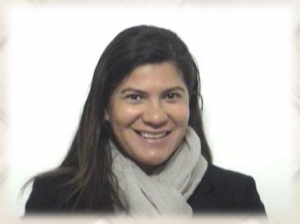 Emma Dunlop-Bennett (Ngāti Maniapoto, Samoan, Pākehā) undertook her doctorate, “Through their eyes: a Samoan perspective on child wellbeing”, while based principally in Wellington. Emma’s supervisors have included Assoc Professor Jenny Bryant-Tokalau, Dr Michelle Schaaf, Assoc Professor Bev Lawton and Professor Tony Dowell.
Emma Dunlop-Bennett (Ngāti Maniapoto, Samoan, Pākehā) undertook her doctorate, “Through their eyes: a Samoan perspective on child wellbeing”, while based principally in Wellington. Emma’s supervisors have included Assoc Professor Jenny Bryant-Tokalau, Dr Michelle Schaaf, Assoc Professor Bev Lawton and Professor Tony Dowell.
Her abstract reads: Child wellbeing is the subject of a considerable body of research and policy making globally, and in New Zealand today. Despite its extensive use, the concept of child wellbeing is used differently across disciplines and across diverse social and cultural contexts. Little of the extant literature recognises the influence of ‘other’ worldviews, cultural beliefs, values, and ways of knowing. Further, the voices of children are largely missing in the child wellbeing debates, despite the fact that children are able to offer authoritative knowledge of their world and of their experiences. A review of the literature on Pasifika, children and childhoods, and wellbeing, highlights that there is currently no literature in New Zealand that connects these three areas together. This is the gap where this research contributes new knowledge to understanding – from the standpoint of Samoan children and their parents living in Wellington – how they conceptualise child wellbeing. The Samoan diaspora is the focus of this research given the diversity that exists within Pasifika.
Guided by the Talanoa ile i’a (Faleolo, 2009), this exploratory research positions children as ‘experts’ on their wellbeing and creates the space for them to share their knowledge. The Samoan children do so through combining Samoan (talanoaga) and Western (photovoice) research methods. The Samoan children took 10 photos of what made them feel ‘happy, safe, and loved’, which they used to guide their talanoa. The views of their parents were elicited through talanoaga.
From the talanoaga, the Samoan children defined their wellbeing as “a bunch of stuff that has good bits and bad bits”. This definition picks up the relational aspect of wellbeing as well as resilience. Four factors are important to their wellbeing, which are: social connections, not having to worry, feeling valued and included, and being a good person. Connecting with people, particularly their family, stands out as being of overwhelming importance to their wellbeing. The Samoan children bring these ideas together conceptually as a seesaw in a playground. Parents conceptualise the wellbeing of their children as ola manaia or the beautiful life. They see their main role as laying the foundations on which their children could have a beautiful life. For many parents, they are drawing on the fa’asamoa and the way in which they have been raised, but ‘tweaking’ this to account for shifts in the broader context. Of note, parents view wellbeing in terms of their children being happy and emotionally stable, being good people, having values, and that they do something meaningful with their lives that they were passionate about. The talanoa from the parents are woven together as the Ola Manaia model that captures the importance of resilience and the relational aspect of wellbeing.
This research has significance in terms of adding to the community, national and global body of knowledge on child wellbeing. This is the first New Zealand study of the wellbeing of Samoan children that gives priority to the voices of children. In doing so, it adds the child’s voice as well as the ‘other’ to the child wellbeing literature, and does this in a holistic way that takes account of the multi-dimensional aspect of child wellbeing. Further, this research reinforces that, when given the opportunity, children are able to make an incredible contribution to issues that affect them.
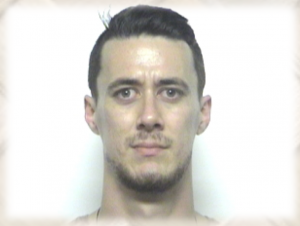 Paratene (Hirini) Tane‘s thesis topic discusses “Whakapapakainga: a template for the cross-generational development of marae-communities.” Hirini’s supervisors include Professors Paul Tapsell, Merata Kawharu and Poia Rewi.
Paratene (Hirini) Tane‘s thesis topic discusses “Whakapapakainga: a template for the cross-generational development of marae-communities.” Hirini’s supervisors include Professors Paul Tapsell, Merata Kawharu and Poia Rewi.
His abstract explains: Through case study research located in Northland, New Zealand, this thesis investigates the future of papakāinga (kin-community settlements) and their marae (ancestral centres of tribal identity). Māori kin-communities have transformed in response to crisis and opportunity over generations. Due to historical impacts of Māori land alienation, individualisation, and Māori urbanisation, the binding fabric of papakāinga – kinship and economy – has weakened.
‘Whakapapakāinga: a template for the cross-generational development of marae-communities’ investigates the concerns and hopes of the descendants of Oromahoe regarding the future of their papakāinga. It uses interviews with elders, a Māori land trust; a questionnaire with community descendants (local and non-local), archival research, and reflexive ethnography. The key finding of this research investigation is that papakāinga development should innovate within central needs – energy, housing and food – that restore economy around papakāinga and reactivate functional kinship links between community members.
This thesis is a study in the field of the target audience. The findings are to assist the Oromahoe Trust, the Oromahoe marae and its descendants (local and non-local) in shaping a strategic direction for their ancestral settlement, their papakāinga. The findings also provide an kin-insider approach to papakāinga development for housing development agencies, district and regional councils, funding agencies, banks, architecture firms, solar technology suppliers and Māori and non-Māori agricultural and horticultural enterprises that neighbour papakāinga. It is important not only to New Zealand’s 778 papakāinga, but also small indigenous communities elsewhere in the world facing similar crises of relevance to descendant diasporas, identity and development.
Latest PhD submission
Te Tumu is proud to announce the latest PhD submissions by one of our students, Raphael Richter-Gravier, entitled “Manu narratives of Polynesia: a comparative study of birds in 300 traditional Polynesian stories”.
Raphael came to Otago in 2012, having previously studied history in his native France, to pursue a Diploma for Graduates in Japanese and Māori Studies. He was a top student in his reo papers; that he has always achieved the highest grades in all his papers shows his amazing work ethic and flair for languages. He started his PhD in 2016 on bird narratives, with Professor Michael Reilly and Dr Michelle Schaaf of Te Tumu as supervisors. Raphael’s thesis was completed as a “co-tutelle” from both Otago and l’Université de la Polynésie française. Raphael’s other supervisor was Professor Bruno Saura, an expert on Polynesian culture at UPF.
Koia, koia, e hoa. We look forward to your graduation.
New qualification for Te Tumu alumnus
Hone Te Rire is the sort of person who collects qualifications, one of which was our Master of Indigenous Studies, completed in 2009. Hone also trained as an amorangi minister in Te Aka Pūaho (the Presbyterian Māori Synod) and has been working at Nawton Community Presbyterian Church in Hamilton while studying for his Diploma in Ministry through the Knox Centre for Ministry and Leadership.
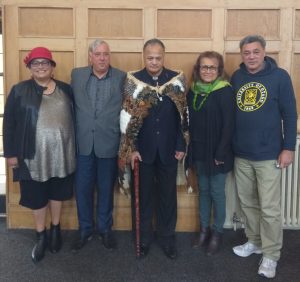
From left: Tangiwai Rewi and Lachy Paterson (Te Tumu), Hone Te Rire, Pearl Matahiki (Tumuaki, Te Huka Mātauraka) and Rev Wayne Te Kaawa (former Moderator of Te Aka Pūaho, and current PhD student and the University’s Māori chaplain).
Several Te Tumu staff members and other University colleagues went along to support Hone at his graduation at John McGlashan College on Wednesday. Hone is considering where his path will lead, and is even contemplating another qualification, a PhD at the University of Otago. Koia ki a koe, e Hone. Kia kaha e hoa.

